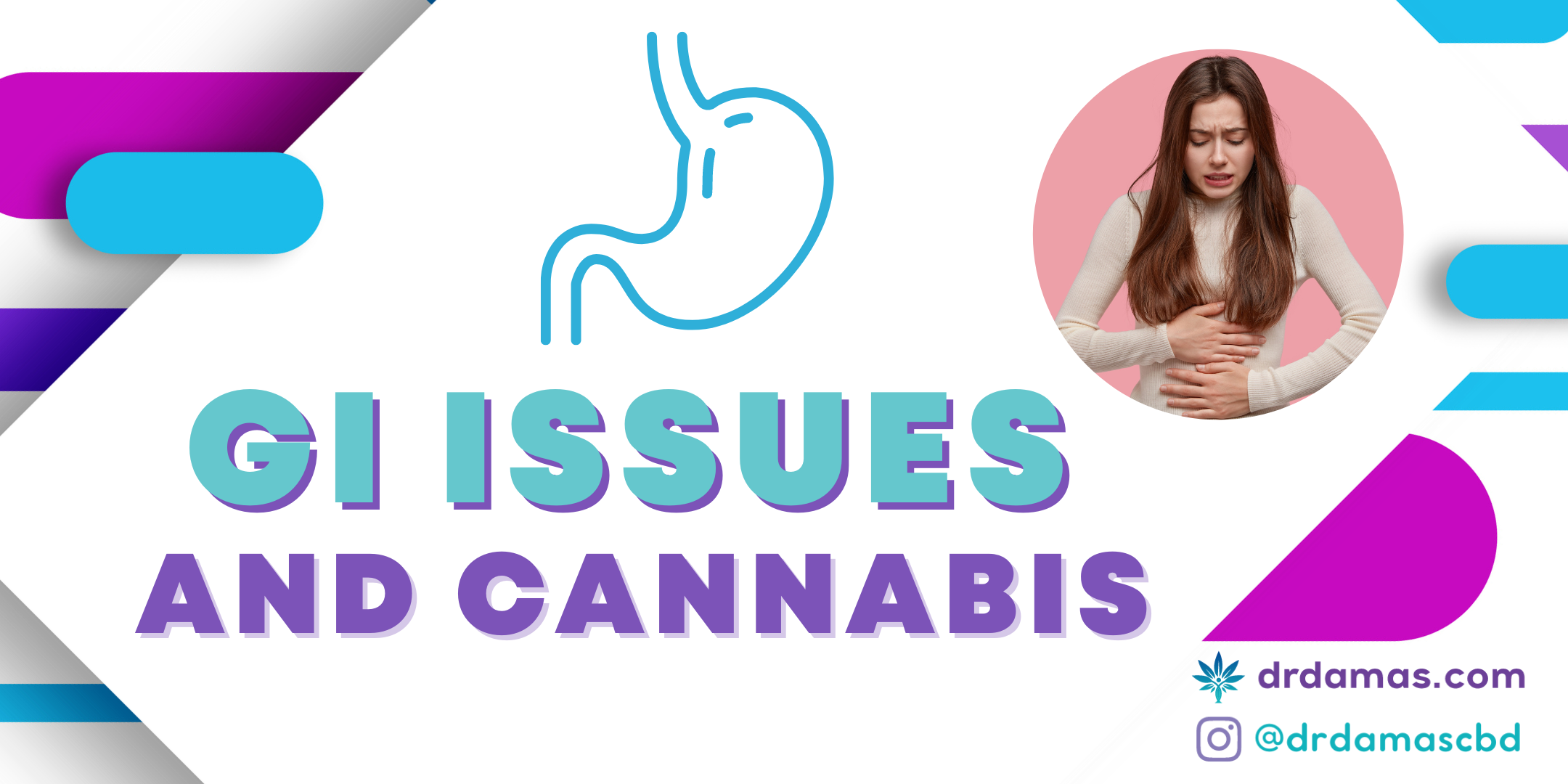GI Issues: Ulcerative Colitis, Crohns, IBS and Cannabis
Like many of you, as I’ve gotten older I’ve found that I am more and more sensitive to the foods that I eat. Fortunately, outside of being lactose intolerant I don't personally have any major gut issues. Unfortunately for many of my patients, the opposite is true. Gastrointestinal (GI) disorders such as Ulcerative Colitis, Crohn's Disease, and Irritable Bowel Syndrome (IBS) affect millions worldwide, presenting complex challenges in healthcare and patient well-being. Inflammatory bowel disease (IBD) like Crohn’s and Ulcerative Colitis are commonly accepted conditions for recommending medical marijuana in states that have legalized it. But why? Can they actually help? Let’s check it out…
Defining the Conditions:
Ulcerative Colitis (UC) is a long-term condition that results in inflammation and ulcers in the innermost lining of the colon and rectum. Symptoms include rectal bleeding, frequent diarrhea, and abdominal pain. It's a chronic condition that can significantly affect the quality of life.
Crohn's Disease is another form of IBD that can affect any part of the gastrointestinal tract from the mouth to the anus. It often spreads deep into the layers of affected bowel tissue. Symptoms can be severe and may include abdominal pain, severe diarrhea, fatigue, weight loss, and malnutrition.
Irritable Bowel Syndrome (IBS), though not characterized by visible inflammation like UC and Crohn's, disturbs the functionality of the digestive system. Symptoms include abdominal pain, bloating, gas, diarrhea, and constipation, varying in severity and duration from person to person.
Pearls:
IBD, including UC and Crohn's, involves immune system dysfunction, leading to chronic inflammation, while IBS is primarily a functional disorder.
Early and accurate diagnosis can improve management and outcomes for UC and Crohn's, while IBS management focuses on symptom relief and quality of life improvement.
Demographic Data: Who does this affect?
The prevalence of IBD varies globally, with the highest rates observed in North America and Europe. Recent studies indicate rising prevalence in newly industrialized countries, pointing to potential environmental and lifestyle factors.
In the United States, approximately 1.6 million people are affected by IBD, with Crohn's Disease and Ulcerative Colitis each accounting for about half of these cases. The conditions are most commonly diagnosed in individuals between 15 and 35 years old, though they can occur at any age.
Gender distribution in IBD shows a slight male predominance in Crohn's Disease and a female predominance in Ulcerative Colitis. Socioeconomic status also plays a role, with varying access to healthcare resources affecting diagnosis and management outcomes.
IBS affects an estimated 10-15% of the global population, with a notable prevalence among women and individuals under 50. Like IBD, IBS prevalence is influenced by factors such as diet, stress, and lifestyle, with significant variations observed across different regions and cultures.
Pearls:
Environmental factors, including diet, hygiene, and lifestyle, are increasingly recognized in the epidemiology of GI disorders, suggesting potential areas for prevention and management.
Understanding demographic trends aids in identifying at-risk populations and tailoring public health and clinical interventions to address the global burden of these conditions effectively.
Traditional Treatments: Types, Pros, and Cons
Traditional treatments for GI disorders focus on alleviating symptoms, managing flare-ups, and maintaining remission. The approach varies based on the condition's severity and the patient's response to treatment.
Ulcerative Colitis and Crohn's Disease
Medications: The mainstay treatments include aminosalicylates, corticosteroids, immunomodulators, and biologic agents. For example, aminosalicylates are used to reduce inflammation, while biologics target specific pathways in the immune response to prevent inflammation.
Surgery: In severe cases, surgical intervention may be necessary. For UC, this could mean a colectomy (removal of the colon), while in Crohn's, it might involve removing damaged sections of the GI tract.
Pros: These treatments can be highly effective in reducing symptoms and inducing remission.
Cons: Long-term use of medications can lead to side effects like osteoporosis, hypertension, and increased infection risk. Surgery, while often effective, carries risks and may lead to life-long changes in lifestyle and diet.
Irritable Bowel Syndrome
Diet and Lifestyle Changes: Identifying and avoiding trigger foods can significantly reduce IBS symptoms. Stress management and regular exercise also play a crucial role.
Medications: Depending on whether IBS-C (constipation predominant) or IBS-D (diarrhea predominant), treatments may include fiber supplements, laxatives, anti-diarrheal medications, antispasmodics, and SSRIs for pain and depression.
Pros: These treatments can improve quality of life and are generally low risk.
Cons: Medications may provide only symptomatic relief and not address the underlying cause. Dietary restrictions can also be challenging to maintain.
Pearls:
A multi-faceted approach, combining medications with lifestyle adjustments, often yields the best outcomes in managing traditional GI disorders.
Patient education on the potential side effects and benefits of traditional treatments is crucial for informed decision-making and adherence.
Holistic Treatments: Types, Pros, and Cons
Holistic or alternative treatments focus on treating the person as a whole, considering physical, emotional, and spiritual health. These treatments are often used alongside conventional therapies.
Diet Modifications
Specific Carbohydrate Diet (SCD) and Low FODMAP Diet: These diets aim to reduce the intake of foods that are poorly absorbed by the intestines to decrease symptoms of bloating, gas, and diarrhea.
Gluten-free and Dairy-free Diets: Some individuals may find relief from GI symptoms by eliminating gluten or dairy from their diets.
Pros: These diets can significantly reduce symptoms and improve quality of life.
Cons: They require strict adherence and may be challenging to follow. Nutritional deficiencies can occur without proper planning.
Other Holistic Approaches
Acupuncture: Used to reduce pain and improve bowel function by stimulating specific points on the body.
Probiotics: Can help restore the natural balance of bacteria in the gut, which may be beneficial for IBS and IBD patients.
Stress Reduction Techniques: Yoga, meditation, and mindfulness can reduce stress-related symptoms and improve overall well-being.
Pros: These methods offer additional options for those who do not fully benefit from traditional treatments and are generally considered safe.
Cons: Evidence of efficacy varies, and what works for one individual may not work for another. Some alternative treatments lack rigorous scientific validation.
Pearls:
Integrating diet and lifestyle changes with traditional treatments offers a comprehensive approach to managing GI disorders, potentially reducing the reliance on medications.
Ongoing communication with healthcare providers is vital to ensure that holistic treatments complement conventional therapies and do not interfere with their effectiveness.
Cannabis and CBD: Can it help “calm things down’?
The therapeutic use of cannabis and CBD for gastrointestinal disorders is gaining traction, supported by emerging research that underscores their potential in symptom management and inflammation reduction.
Understanding Cannabis and CBD
Cannabis: Contains numerous active compounds, including THC (tetrahydrocannabinol), which is known for its psychoactive properties and ability to alleviate pain and nausea.
CBD (Cannabidiol): A non-psychoactive compound that has been shown to have anti-inflammatory, analgesic, and anxiolytic effects, making it a compelling option for those seeking relief without the 'high' associated with THC.
Research Highlights
A study published in the "Journal of Clinical Gastroenterology" found that cannabis could induce remission in patients with Crohn's disease and improve quality of life for those with IBD.
Research in the "Inflammatory Bowel Diseases" journal suggests that CBD may help reduce intestinal inflammation and alleviate symptoms of IBD.
A review in the "European Journal of Gastroenterology & Hepatology" highlights the potential benefits and mechanisms by which cannabinoids could influence GI disorders, advocating for more clinical trials to establish efficacy and safety profiles.
Pros: Cannabis and CBD offer alternative treatment pathways, particularly for patients who have not found relief with conventional therapies. They can target multiple symptoms simultaneously, including pain, inflammation, and nausea.
Cons: The long-term effects of cannabis usage are not fully understood, and there is a potential for psychoactive effects with THC. Legal and accessibility issues also vary by region.
Routes of Administration
Cannabis and CBD can be consumed in various forms. I always like to discuss the different ways you can use your plant medicine. There is no right way- each has its own advantages and disadvantages. Here’s a refresher:
Oils and tinctures: Placed under the tongue for absorption through the sublingual mucosa. Offer fast absorption but may have a strong taste.
Inhalation: This method offers the fastest onset of effects but may irritate the lungs and is not suitable for everyone, especially those with respiratory issues.
Oral consumption: Edibles and capsules offer a sustained release of cannabinoids but take longer to take effect (up to 2 hours) and can be unpredictable in terms of dosing.
Topicals: Creams and lotions can be applied directly to areas of pain or inflammation for localized relief but may not be effective for managing widespread symptoms.
Pearls:
Individual responses to cannabis and CBD can vary significantly, highlighting the need for personalized treatment approaches and close monitoring by healthcare providers.
The evolving legal landscape and ongoing research continue to shape the accessibility and understanding of cannabis and CBD in GI disorder management.
Wrapping It All Up
GI disorders like other chronic conditions can negatively impact a person's physical and mental health as well as quality of life in a number of ways. That is why managing GI disorders requires a multifaceted approach, incorporating traditional and innovative treatments. Cannabis and CBD have become more attractive options to people suffering with these conditions and despite some promising research, care should be taken when looking to incorporate them into your treatment plans. Always consult with your doctor or healthcare provider before adding or taking any supplements. If you decide to incorporate cannabis or CBD, make sure you only purchase from reputable and trusted sources. And of course, if you ever need specific help, you can feel free to contact us directly.
Pearls:
Personalized care is paramount, as GI disorders manifest uniquely across individuals, necessitating tailored treatment approaches.
Staying informed about the latest research, treatment innovations, and holistic approaches can empower you as a patient in making informed healthcare decisions.















